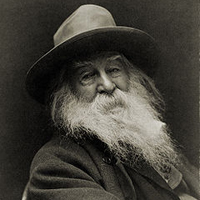Out of the Cradle Endlessly Rocking by Walt Whitman: Summary and Analysis
Out of the Cradle Endlessly Rocking previously published as A Word out of the Sea in 1860 in his poetic collection 'Leaves of Grass' is composed by famous American poet Walt Whitman. Written in free lyrical verse this poem is one of the most influential and difficult one. This poem is addressed to an unknown listener or audience, or the speaker might be talking to Self. Autobiographical elements are in this poem.

Walt Whitman (1819-1892)
The poetic persona remembers about a past incident inspired by the unceasingly rocking of the sea waves. He remembers that as a child, he left the mother’s womb, which is a cradle of human life, he also left the bed and roamed alone in search of the secret of life and death. Life itself is the cradle that is continually rocked by death. He remembers the sea shore with strong waves and the pair of birds loving each other and singing to one another. One day, the she-bird did not return to the nest and the he-bird was worried. He waited for her and desperately looked for her here and there. The poetic person, then a boy, heard everything and also understood the pain and agony of the separation of the he-bird. The lamentation of the bird touched him deeply. The boy and the male bird did not have any clue about the whereabouts of the female bird. Then the sea gave hints to the boy (now the poet) ‘the word final, superior to all’, ‘delicious word death……/Death, death.’ These clues and the painful song of the he-bird marked the beginning of his poetic career. He was enlightened by the truth that death is the final destiny of any creatures. Death rocked the cradle of life endlessly. The lonely bird singing to relieve his pain is a metaphor here for arousing the poetic spirit in the poet.
This poem is an elegy by the male bird in the death of his sweetheart. As an elegy, this poem has following features; death of some dear one, here the death of the female bird, as the main subject of the poem. The nature too mourns on the death, in this poem, the sea is restless and the moon is lagging behind on the separation of the loving birds. The mourner laments and recalls the past happiness, the speaker tells us the past happy situations of the birds. As almost all the elegy has the consolation through the realization that death is final and superior, this poem too has the ending with the poet and the lone bird realizing the final truth of the death.
Through this elegy, Walt Whitman presents his attitude towards death through the medium of he-bird. For Whitman death is not the end of life, but the beginning of another form of life. It is true that death is the beginning of another form of life. It is true that death is superior and final, yet it can make us enter another phase of life. The body dies, but the soul continues in another form. With this belief he has presented the elegy of he-bird whose mate is gone, and yet he has hope that her life has continued elsewhere. Seeing the dusky spot in the moon, he guesses that his beloved is there. So he requests moon not to keep her away from him. He even hopes that his beloved will rise at the shining stars. Moreover, the sea or land will give him back his mate. All these requests made to the moon, land, sea and stars presuppose the continuation of life somewhere in another form.
The title of the poem itself is symbolic to the birth. Cradle is metaphorically a mother’s womb and at the same time, it can be a life which is rocked by the death. So, the title has dual meaning: one refers to the birth from mother’s womb, and if the cradle is taken as the life, it refers to the death. The implied theme of the poem is the connection between grief and art. The poem vividly depicts the growing process of the boy from immaturity to maturity through his live experience of the love of the birds and the death of one bird. Any piece of art is created through frustrations and death only releases us from such frustrations.
The poem is full of musicality in the first twenty two lines with rhyming pattern and wavelike quality. This poem flows like a wave with poetic syntax.
Site this Page!
Shrestha, Roma. "Out of the Cradle Endlessly Rocking by Walt Whitman: Summary and Analysis." BachelorandMaster, 10 May 2018, bachelorandmaster.com/britishandamericanpoetry/out-of-the-cradle-endlessly-rocking.html.
Related Topics
The World Below the Brine: Analysis
When Lilacs Last in the Dooryard Bloom'd: Analysis
Crossing Brooklyn Ferry: Summary
Crossing Brooklyn Ferry: Analysis
Song of Myself (Section 1: Summary & Analysis)
Song of Myself (Section 6: Summary & Analysis)
Song of Myself (Section 11: Summary & Analysis)
Song of Myself (Section 52: Summary & Analysis)
 |
bachelorandmaster.com |